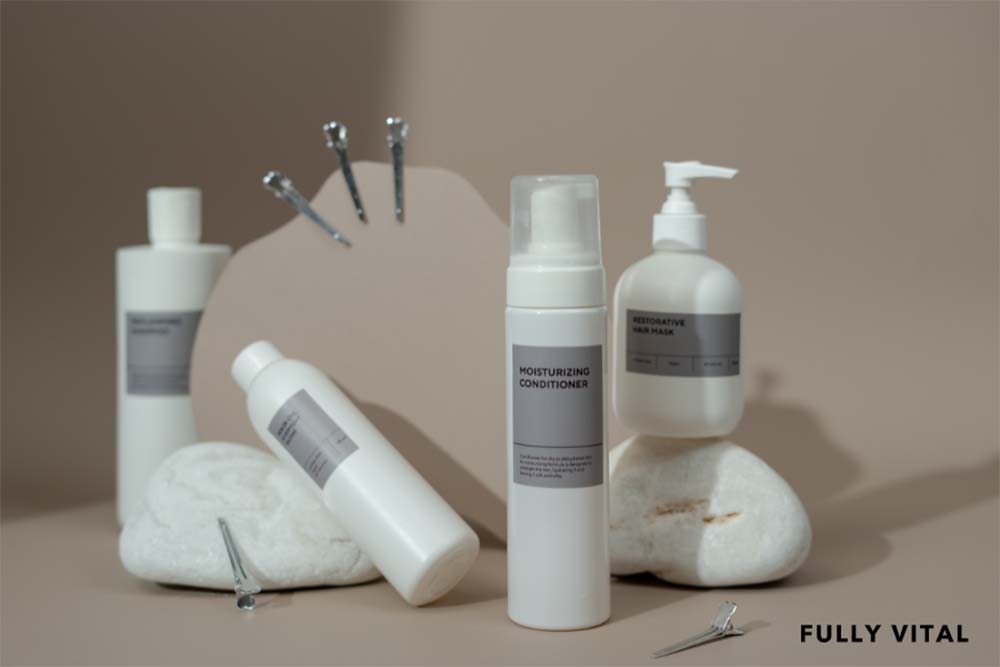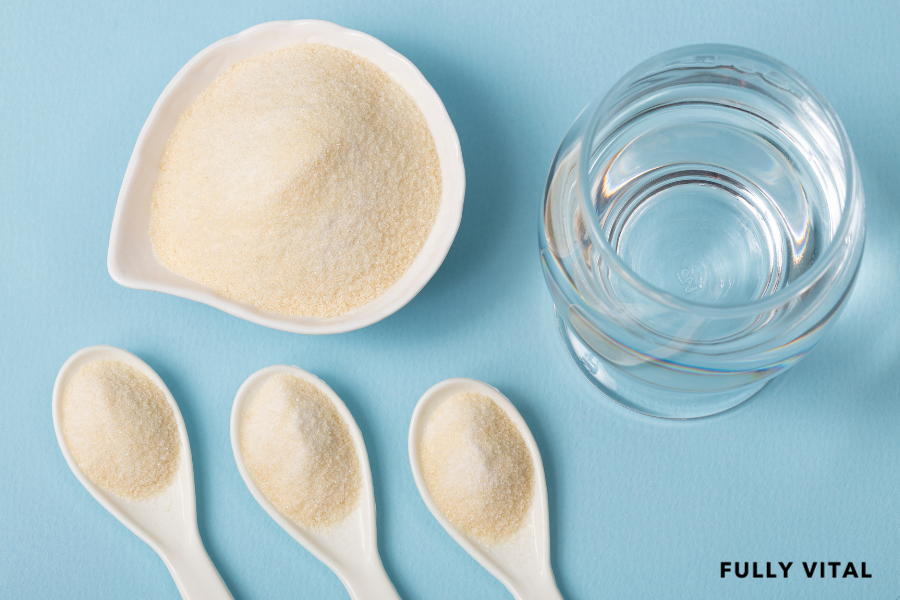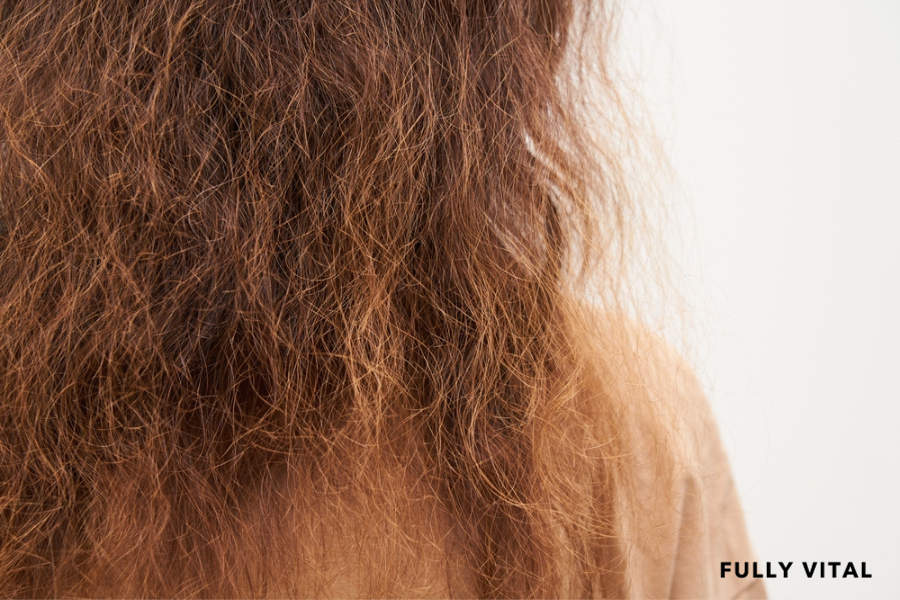
Understanding Hair Conditioner: A Comprehensive Guide
Welcome to our in-depth guide on hair conditioner, an essential component of any hair care routine.
Whether you have curly, straight, or wavy hair, our goal is to provide you with valuable insights to help you achieve the luscious locks you've always dreamed of.
In this article, we will explore everything you need to know about hair conditioner, its importance, benefits, how it works, potential downsides, and alternatives.
Let's dive right in!

I LOVE MY HAIR NOW
FullyVital hair serum and hair vitamins made tremendous improvements in my hair. I truly love my hair now.
Dorit S.,
What Is A Hair Conditioner?
Hair conditioner is a specialized hair care product designed to improve the texture, manageability, and overall health of your hair.
It contains a unique blend of ingredients that nourish and hydrate your hair, leaving it soft, smooth, and more resilient.

Why Is Hair Conditioner Important?
Hair conditioner plays a crucial role in maintaining the health and beauty of your hair. Here's why it's so important:
Hydration
Hair conditioner provides essential moisture to your hair, preventing dryness and brittleness.1
Detangling
It helps to detangle knots and reduce breakage, making combing and styling easier.
Enhanced Shine
Conditioner adds a natural shine to your hair, giving it a healthy, vibrant appearance.
Damage Repair
It can repair and protect hair from the daily wear and tear caused by styling and environmental factors.
How Does Hair Conditioner Work?
Hair conditioner works by forming a protective layer around the hair shaft.
This layer seals in moisture, preventing it from escaping, and also shields your hair from external damage.
Additionally, the ingredients in conditioner can penetrate the hair cuticle, providing nourishment from within.
What Are The Benefits Of Hair Conditioner?
Using hair conditioner regularly offers a range of benefits, including:
- Improved Texture: Conditioner makes your hair softer and smoother to the touch.
- Reduced Frizz: It helps control frizz, keeping your hair looking sleek and well-groomed.
- Increased Strength: Conditioning strengthens hair strands, reducing breakage.
- Enhanced Manageability: Your hair becomes more manageable, making styling a breeze.
Are There Any Downsides To Hair Conditioners?
While hair conditioner is generally beneficial, there are a few potential downsides to consider:
- Overuse: Using too much conditioner can make your hair appear greasy and weighed down.
- Allergic Reactions: Some individuals may be sensitive to certain ingredients in conditioners.
- Buildup: If not rinsed out properly, conditioner residue can accumulate on the scalp, leading to a greasy feeling.
What Are The Alternatives To Hair Conditioners?
If you're looking for alternatives to traditional hair conditioner, consider these options:
Leave-In Conditioner
These products are applied to damp hair and left in, providing continuous hydration and protection.
Hair Masks
Deep conditioning masks offer intensive nourishment and repair for damaged hair.
Natural Oils
Oils like coconut oil, argan oil, and jojoba oil can be used as natural conditioners.
When Should I Use a Hair Conditioner?
Hair conditioner should be used after shampooing your hair.
It is an essential step in your hair care routine that follows cleansing.
This ensures that your hair receives the necessary hydration and protection it needs.
Is It Necessary To Use A Hair Conditioner?
Yes, using hair conditioner is highly recommended for maintaining the health and appearance of your hair.2
While it may not be an absolute necessity for everyone, it offers numerous benefits, such as improved texture, reduced breakage, and enhanced manageability.
Do We Need A Hair Conditioner Every Time?
Using a hair conditioner every time you wash your hair is not mandatory, but it is beneficial.
The frequency of use depends on your hair type and its specific needs.
Most people benefit from using conditioner 2-3 times a week, while others with dry or damaged hair may prefer daily use.
What Happens If You Don't Use a Hair Conditioner?
Skipping the use of hair conditioner can have several consequences, including:
- Dryness: Your hair may become dry and brittle, leading to increased breakage.
- Frizz: Without conditioner, controlling frizz and flyaways becomes more challenging.
- Tangles: Hair may become more prone to tangling, making it difficult to manage.
- Lackluster Appearance: Your hair may lose its shine and look dull.
How To Apply A Hair Conditioner For The Best Results?
To achieve the best results when applying hair conditioner, follow these steps:
- Shampoo First: Begin by shampooing your hair to remove dirt and excess oils.
- Squeeze Out Excess Water: After rinsing out the shampoo, gently squeeze out excess water from your hair. It should be damp but not dripping wet.
- Apply Conditioner: Dispense an appropriate amount of conditioner into your palm. The amount you use depends on the length and thickness of your hair.
- Focus on the Ends: Start applying the conditioner from the mid-length of your hair to the ends. These areas tend to be drier and need more moisture.
- Avoid the Scalp: Avoid applying conditioner directly to your scalp, as it can make your hair appear greasy.
- Massage In: Use your fingers to gently massage the conditioner into your hair, ensuring even distribution.
- Leave In for a Few Minutes: Allow the conditioner to sit for 1-2 minutes, or as directed on the product label.
- Rinse Thoroughly: Rinse your hair thoroughly with lukewarm water until all the conditioner is washed out.
By following these steps, you can maximize the benefits of your hair conditioner, leaving your hair soft, smooth, and well-nourished.
What Is The History Of Hair Conditioners?
Historical Milestones in Hair Conditioning
- Ancient Roots: Hair conditioning practices can be traced back to ancient civilizations, where natural ingredients like olive oil and honey were used to soften and beautify hair.
- Early Formulations: The modern concept of hair conditioner began in the early 20th century with basic formulations containing oils and fats.
- Advancements in Ingredients: Over the decades, hair conditioner formulas have evolved with the introduction of innovative ingredients like silicones, proteins, and vitamins.
- Mainstream Adoption: Hair conditioners gained popularity in the mid-20th century as they became more affordable and accessible to the general public.
What Is The Current Landscape Of Hair Conditioners?
Market Trends and Preferences
- Diversity of Products: The market now offers an extensive range of hair conditioners, including those for specific hair types, concerns, and environmental factors.
- Natural and Organic: There is a growing demand for natural and organic conditioner options, driven by consumer preferences for clean beauty products.
- Sustainability: Brands are increasingly focusing on sustainable packaging and eco-friendly formulations to align with environmental consciousness.
- Customization: Some companies offer personalized conditioner solutions, allowing customers to tailor products to their unique needs.
Scientific Advancements
- Research and Innovation: Ongoing research in hair science has led to the development of advanced conditioner formulations that address specific hair growth and health concerns.3
- Clinical Trials: Some hair conditioner products undergo clinical trials to substantiate their claims regarding hair growth stimulation.
- Emerging Technologies: The integration of technology, such as smart devices for hair analysis, is shaping the future of personalized hair care.
What Is The Future Of Hair Conditioners?
Advanced Formulations
- Biotechnology: Expect the use of biotechnological processes to create hair conditioner ingredients that mimic natural hair proteins, enhancing repair and growth stimulation.
- Nutraceuticals: Look for conditioners enriched with nutraceutical ingredients that nourish hair from the inside out, promoting long-term hair health.
- Sustainability: The industry will continue to prioritize eco-friendly practices, from sourcing ingredients to packaging, to meet the demands of environmentally conscious consumers.
Personalized Hair Care
- AI and Data Analysis: Anticipate the integration of artificial intelligence and data analysis to offer personalized conditioner recommendations based on individual hair profiles.
- Custom Formulations: Companies may offer the option to create bespoke conditioner blends tailored to a customer's specific hair type, goals, and preferences.
- Digital Connectivity: Smart conditioner dispensers and apps may become prevalent, providing real-time hair health insights and product recommendations.
Unlock The Secret To Timeless HairDiscover Fully Vital's range of powerful, science-backed hair growth products. Our mission is to help you slow down and reverse the aging of your hair, so you can enjoy a healthier, more vibrant relationship with your locks. Experience the Benefits:
Don't let time dictate the fate of your hair. Take action now and embrace the Fully Vital difference. Your journey to timeless hair begins here! |
Final Thoughts On Hair Conditioner
We've explored the world of hair conditioner, from its origins to its current importance in modern hair care.
We've discussed its role in enhancing the health and beauty of your locks, offering valuable insights into why it's an essential component of any hair care routine.
At Fully Vital, we understand the significance of healthy and vibrant hair.
Our range of hair growth products is designed to combat the effects of aging on your hair, ensuring that you can maintain a strong and radiant relationship with your locks.
Whether you're looking to boost growth, prevent damage, or simply enjoy the luxury of luscious hair, our products are tailored to meet your needs.
So, why wait? Take the next step in your journey to healthier, more beautiful hair with Fully Vital's hair growth solutions.
Your hair deserves the care it needs to thrive.
Frequently Asked Questions about Hair Conditioner
Can I use a hair conditioner if I have oily hair?
Yes, you can use a lightweight conditioner designed for oily hair types.
Focus on applying it to the ends of your hair and avoid the scalp to prevent excessive oiliness.
Is it necessary to use hair conditioner every day?
Using a conditioner every day is not necessary.
Most people benefit from using it 2-3 times a week, while others with dry or damaged hair may benefit from daily use.
Are there conditioners specifically for curly hair?
Yes, there are conditioners formulated for curly hair that provide extra moisture and help define curls.
Can I use conditioner on color-treated hair?
Absolutely! There are conditioners designed to protect and extend the life of your hair color.
How long should I leave conditioner in my hair?
Follow the instructions on the product label.
Most conditioners are left on for 1-2 minutes before rinsing.
Is it necessary to use conditioner if I have short hair?
Even with short hair, using conditioner can improve texture and manageability.
Consider using a lighter conditioner for short styles.
Is it necessary to use a separate conditioner if I use a 2-in-1 shampoo and conditioner product?
While 2-in-1 shampoo and conditioner products can be convenient, they may not provide the same level of conditioning as a dedicated conditioner.
If you have specific hair care concerns, such as dryness or damage, using a separate conditioner in addition to your 2-in-1 product may yield better results.
Can I use a hair conditioner as a leave-in conditioner?
Some hair conditioners are designed to be used as leave-in conditioners.
Check the product label to see if it's suitable for leave-in use.
If not, it's best to rinse out regular conditioner as leaving it in may lead to product buildup and greasiness.
Are there natural alternatives to commercial hair conditioners?
Yes, there are natural alternatives to commercial hair conditioners.
Natural oils like coconut oil, argan oil, and olive oil can be used as deep conditioners.
Simply apply a small amount to your hair, leave it on for at least 30 minutes, and then rinse.
Additionally, aloe vera gel can serve as a lightweight natural conditioner.
Can I use hair conditioner if I have a sensitive scalp?
Yes, you can use hair conditioner if you have a sensitive scalp.
However, be mindful of the ingredients in the conditioner.
Look for products labeled as hypoallergenic or formulated for sensitive scalps.
It's also a good idea to do a patch test before applying the conditioner to your entire scalp to ensure it doesn't cause irritation.
Sources:
- Vinall, M. (2020, October 28). Shampoo ingredients for different hair needs: What to look for. Healthline. https://www.healthline.com/health/shampoo-ingredients-for-different-hair-needs
- How to Use Conditioner on Hair: Best Practices by Type and by Hair. (2019, October 24). Healthline. https://www.healthline.com/health/how-to-use-hair-conditioner
- Nayak, B. S., Ann, C. Y., Azhar, A. B., Ling, E. C. S., Yen, W. H., & Aithal, P. A. (2017). A Study on Scalp Hair Health and Hair Care Practices among Malaysian Medical Students. International Journal of Trichology, 9(2), 58–62. https://doi.org/10.4103/ijt.ijt_76_16







